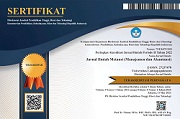Manajemen Proyek Inovasi Mahasiswa (Studi Kasus Ecostove Dalam Program Pembinaan Wirausaha P2mw 2024)
Abstract
This study aims to describe the project management process of student innovation through a case study of the development of EcoStove, a portable stove powered by used cooking oil, within the framework of the 2024 Student Entrepreneurship Development Program (P2MW). EcoStove was initiated by a team of Digital Business students in response to household waste issues and the market demand for eco-friendly outdoor equipment. The research employs a qualitative descriptive approach using a case study method. Data were collected through participatory observation, documentation of activity reports, and reflections from students and supervising lecturers over a five-month implementation period. The results show that students successfully applied project management principles systematically, covering planning, prototype development, field testing, digital promotion, limited product sales, and final evaluation. In addition to delivering a useful and environmentally friendly product, student involvement in the project fostered the development of key entrepreneurial competencies, including critical thinking, communication, teamwork, and environmental awareness. Key success factors include financial support from the P2MW grant, active guidance from supervising lecturers, and academic recognition through credit conversion aligned with the Merdeka Belajar Kampus Merdeka (MBKM) policy. This study concludes that eco-innovation-based entrepreneurship projects serve as effective learning models that not only nurture entrepreneurial character but also promote social and environmental contributions. These findings offer theoretical implications for the advancement of experiential learning and eco-innovation literature in entrepreneurship education, as well as practical implications for higher education institutions in designing project-based learning programs that emphasize sustainability and entrepreneurial competence.
References
Afifi, R., & Yulisma, L. (2020). Implementasi Model Pembelajaran Berbasis Proyek Dalam Praktikum untuk Meningkatkan Intensi Berwirausaha Mahasiswa. Quagga: Jurnal Pendidikan Dan Biologi, 12(1), 17–23.
Anjum, T., Farrukh, M., Heidler, P., & Díaz Tautiva, J. A. (2020). Entrepreneurial intention: Creativity, entrepreneurship, and university support. Journal of Open Innovation: Technology, Market, and Complexity, 7(1), 11.
Belferik, R., Andiyan, A., Zulkarnain, I., Munizu, M., Samosir, J. M., Afriyadi, H., Rusmiatmoko, D., Adhicandra, I., Syamil, A., & Ichsan, M. (2023). Manajemen Proyek: Teori & Penerapannya. PT. Sonpedia Publishing Indonesia.
Firdaus, M. I. N., & Rush, D. I. (2024). Peran Orientasi Kewirausahaan Pada Pembelajaran Dalam Meningkatkan Kreativitas Lulusan. Jurnal Ilmiah Edunomika, 8(1).
Galib, M., Gunawan, A., Maulana, M., & Syam, J. (2025). Sinergi Kampus dan Dunia Usaha dalam Meningkatkan Kompetensi Mahasiswa melalui Pelatihan Dasar Manajerial Proyek. ABDI DAYA: Jurnal Pengabdian Dan Pemberdayaan Masyarakat, 2(2), 79–92.
Hughes, J. K., Layne, K., Kolbfleisch, D., & Misciagno, S. A. (n.d.). Experiential Learning Theory. In Routledge Companion to Occupational Therapy (pp. 698–710). Routledge.
Kerzner, H. (2025). Project management: a systems approach to planning, scheduling, and controlling. John Wiley & Sons.
Loviscek, V. (2020). Triple bottom line toward a holistic framework for sustainability: A systematic review. Revista de Administração Contemporânea, 25(3), e200017.
Manning, L., Smith, R., Conley, G., & Halsey, L. (2020). Ecopreneurial education and support: Developing the innovators of today and tomorrow. Sustainability, 12(21), 9228.
Meyanti, I. G. A. S., Sutajaya, I. M., & Sudiarta, I. G. P. (2023). Implikasi Pendidikan Kewirausahaan dalam Membentuk Minat dan Kompetensi Wirausaha. Bisma: Jurnal Manajemen, 9(3), 292–299.
Nuringsih, K., Nuryasman, M. N., & Rosa, J. A. (2022). Mendorong green entrepreneurial intention melalui green economy dan green entrepreneurial orientation. Jurnal Ekonomi, 27(3), 417–440.
Rachmat, Z., Baali, Y., Rukmana, A. Y., Wonua, A. R., Sudirjo, F., Handiman, U. T., Ekopriyono, A., & Irawan, I. A. (2023). Pengembangan kewirausahaan. Get Press Indonesia.
Saefullah, A., Hidayatullah, S., Noviar, E., Fadli, A., Herawati, T., & Nurhayati, N. (2022). Pengembangan skill wirausaha mahasiswa STIE Ganesha melalui Program Pembinaan Mahasiswa Wirausaha (P2MW) Kemdikbudristek RI Tahun 2022. Unri Conference Series: Community Engagement, 4, 164–174.
Shrestha, N., & Rijal, M. (2022). Ecopreneurship: A sustainable model as entrepreneurship education for transformation. Journal of Kathmandu BernHardt College, 37–42.
Ślęzak, M. (2020). Eco-innovations and their role in contemporary business. Journal of Corporate Responsibility and Leadership, 7(1), 55–69.
Stankevičienė, J., & Nikanorova, M. (2020). Eco-innovation as a pillar for sustainable development of circular economy. Business: Theory and Practice, 21(2), 531–544.
Wibowo, A. (2022). Model bisnis ramah lingkungan (green business). Penerbit Yayasan Prima Agus Teknik, 1–120














